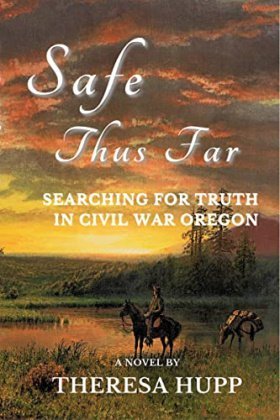“Yes, sir,” Will said.
Joel cuffed Will on the side of the head, though not hard enough to hurt. “I’m no ‘sir,’” he said. “Call me Joel.”
May 12, 1864. Found Joel and joined the militia as a mule packer. What would Mama and Mac think of me now? No word on when we leave Jacksonville.

The mule packers spent a boring week in Jacksonville waiting to hear when Drew would arrive. Jonah pestered Joel to take them into the hills outside of town to pan for gold. Will thought looking for gold was as good a way to spend the time as any, but he let Jonah argue with his brother.
“Ain’t much easy pickin’s left around here,” Joel said in response to Jonah’s cajoling. Joel lazed on his bedroll in the middle of the day.
“C’mon, Joel,” Jonah said. “Ain’t nothin’ else to do.”
“You’ll wish you could rest once we get underway,” Joel said, striking a match to light a cigarette. “Might as well take it easy now.”
But the next morning, Joel rousted the boys and told them he would take them prospecting.
Despite the warm spring weather, Will shivered when they stood in the shallow creek that fed into the Rogue River. Plunging the pans Joel gave them into the icy water and sloshing the sediment until it settled was hard work. By the end of the day, Will’s back hurt from stooping.
“Ain’t as much fun as you thought, huh?” Joel asked his brother.
“Guess you was right,” Jonah said. “Not much gold left in these parts. Didn’t find more’n a couple flakes.”
“Not even worth keeping,” Joel said.
When they returned to camp that afternoon, Will wrote,
May 18, 1864. Panned for gold. Slim pickings and hard labor. Still waiting for word from Lt. Col. Drew.
“What do you know about this Colonel Drew?” Will asked Joel as they got into their bedrolls that night.
Joel shrugged. “Some soldiers say he’s a ditherer—not much of an officer. There’s been talk of need for a road from Jacksonville and Klamath to the east for years, but Drew ain’t done nothin’ about it. Now, finally, he’s been ordered to. But he can’t seem to shake himself loose from the politics in California. Men been callin’ him a Copperhead.”
“Then he’s a Southern sympathizer?” Will asked.
“Seems so,” Joel said. “Lots of other men in these parts are, too. They want the Union to negotiate peace with the Confederates. They think the Army ought to focus on fightin’ Indians, not whites.”
Will nodded. There were plenty of Rebel sympathizers around Oregon City.
“Drew had charge of building Fort Klamath,” Joel said. “Gave a lot of the contracts to his Copperhead friends.” He spat. “Jacksonville’s become a backwater, no trade comin’ south because there’s no good road. All the trade to Idaho Territory goes north along the Columbia and into Portland.” He kicked at the campfire ashes to find live embers, then lit a cigarette from a glowing twig. “We’ll have to see what kind of soldier he is once he gets here.”
Chapter 28: Heading to Fort Klamath
Monday, May 23, began with heavy rain. After tending their horses and mules and eating breakfast, the packers hunkered down in their tents. Every step outside added another layer of mud to their boots.
After the noon meal, Captain Kelly called a muster. The men milled around near the officers’ tents, waiting for Kelly to speak. By that time, the rain had lessened to a light mist, but the dank air chilled Will to his bones.
“I received a message from Colonel Drew,” Kelly began. “He is still delayed in California. But he has ordered me to lead the militia and our civilian support to Fort Klamath. The reconnaissance expedition will depart from there after the colonel arrives.”
“When do we leave Jacksonville?” one of the cavalry sergeants asked.
“At dawn on Thursday,” Kelly replied. “Be ready for inspection Wednesday at noon.” He turned to the teamsters and packers. “Men, if you have any questions, see Sergeants Crockett, Beaty, or Geisy. Sergeant Crockett will act as quartermaster on this expedition, with the other two reporting to him. Sergeant Beaty will oversee provisions, and Sergeant Geisy will have charge of wagons, packers, and mules.”
The next two days were a blur of activity. Will did whatever Joel told him to do. He often fumbled, but he tried his best. The packers turned their horses and mules out to pasture to graze their fill. They cleaned and checked their weapons, examined mule harnesses and panniers, and repaired even the slightest damage to any equipment. They counted and double-counted the provisions. And they washed their clothes.
“Why do I have to wash my clothes?” Jonah complained.
“Might be your last chance for weeks,” Joel replied. “May only be in Klamath for a day or two afore we set out into the mountains.”

The men lined up for inspection shortly before noon on Wednesday, as Captain Kelly had ordered. The cavalry lined up on one side of the road out of Jacksonville, with the teamsters and packers on the other side.
Captain Kelly walked the militia line first, commenting on one man’s uniform, another man’s mount. Then he turned to the civilians. He signaled Sergeants Crockett and Geisy to walk with him. As they passed by Will, the captain nodded, and Will stifled a grin of pride.
Another packer wasn’t so fortunate—Captain Kelly looked at how the panniers sat on that man’s mules and said to Sergeant Geisy, “Beast is unbalanced. He’ll wear blisters before we camp the first night.”
The sergeant pointed at Joel. “Show him how it’s done.” Will stood even straighter, glad to be associated with Joel, whom Sergeant Geisy used as an example.
After finishing the inspection, Kelly shouted at the entire company, “Be ready to leave at dawn.”

























